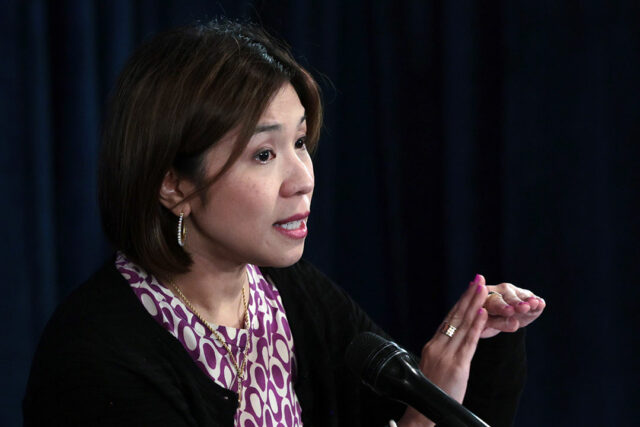DBM chief issues national budget call for 2025

THE 2025 national budget will focus on keeping inflation under control, addressing the economic scarring from the pandemic, boosting infrastructure investments, and adapting global trends in digital transformation, the Department of Budget and Management (DBM) said.
Budget Secretary Amenah F. Pangandaman last week issued the National Budget Call in a memorandum, asking government agencies to begin preparing their budget proposals for 2025.
The proposed 2025 national budget is set at P6.12 trillion, according to the Development Budget Coordination Committee. This is 6.1% higher than the P5.768-trillion national budget for 2024.
“The Fiscal Year 2025 budget aims to continuously address the socioeconomic issues our country has been facing, e.g., high food prices, increasing fuel prices, and the scars that the pandemic has left, among others,” the DBM said.
The government is targeting 6.5-7.5% gross domestic product (GDP) growth this year, but the outlook is clouded by risks to inflation, tight borrowing costs, and a global slowdown.
To tame inflation, the Bangko Sentral ng Pilipinas (BSP) has tightened interest rates by 450 basis points from May 2022 to October 2023, bringing the key rate to a 16-year high of 6.5%.
Aside from addressing economic issues, the 2025 spending plan will also support infrastructure investments, with emphasis on flagship infrastructure projects approved by the National Economic and Development Authority.
“However, increased infrastructure spending will not, in any way, detract from the full support provided to the poorest, lagging, climate change and disaster risk vulnerable areas nor the social sector, and basic public services,” the DBM said.
The government also seeks to adopt emerging global trends on digital transformation to boost and foster efficiency, effectiveness, and transparency of service delivery.
The 2025 budget will also include funds for capacity-building programs for local government units (LGUs) such as competency-enhancing interventions, resource generation, public financial management, leadership and development planning, among others.
This is aimed at helping LGUs in assuming the devolved functions and services from the National Government, as mandated by the Supreme Court’s Mandanas-Garcia ruling.
The DBM said the proposed 2025 budget and its priorities will be anchored on the government’s commitment to achieve the 2030 Agenda for Sustainable Development.
“With six years remaining until the 2030 Agenda, there is a need to accelerate the progress or reverse the negative trends to achieve the global goals of establishing a transformative vision towards economic, social, and environmental sustainability,” it said.
The 2025 budget proposals should include the priorities and policy directions of the Marcos administration, citing the government’s medium-term fiscal framework, the eight-point socioeconomic agenda and the Philippine Development Plan for 2023-2028.
However, due to the impact of the country’s debt burden and competing demands from government agencies, the budget allocation for 2025 will be optimized.
“As part of the evaluation process, the government will consider how the agencies utilized their previous year budget and the implementation progress of their mandated programs and projects to ensure that only those agency proposals, which are implementation-ready, are included in the budget,” the DBM said.
The DBM said agencies should provide the necessary supporting documents such as concrete program plans and designs that outline procurement and implementation milestones.
The budget should also ensure regional plans are in line with national priorities “to achieve equitable regional investment opportunities and growth,” it added.
“In particular, the National Government’s 2025 budget shall provide funds for agencies’ regional programs which are responsive to the needs of the poorest, disadvantaged and lagging LGUs,” the Budget department added.
According to the DBM memorandum, government agencies should submit their signed hard copies of the 2025 budget proposals between March 25 and April 22.
The proposed 2025 national budget will be submitted to Congress on July 22. — Keisha B. Ta-asan



